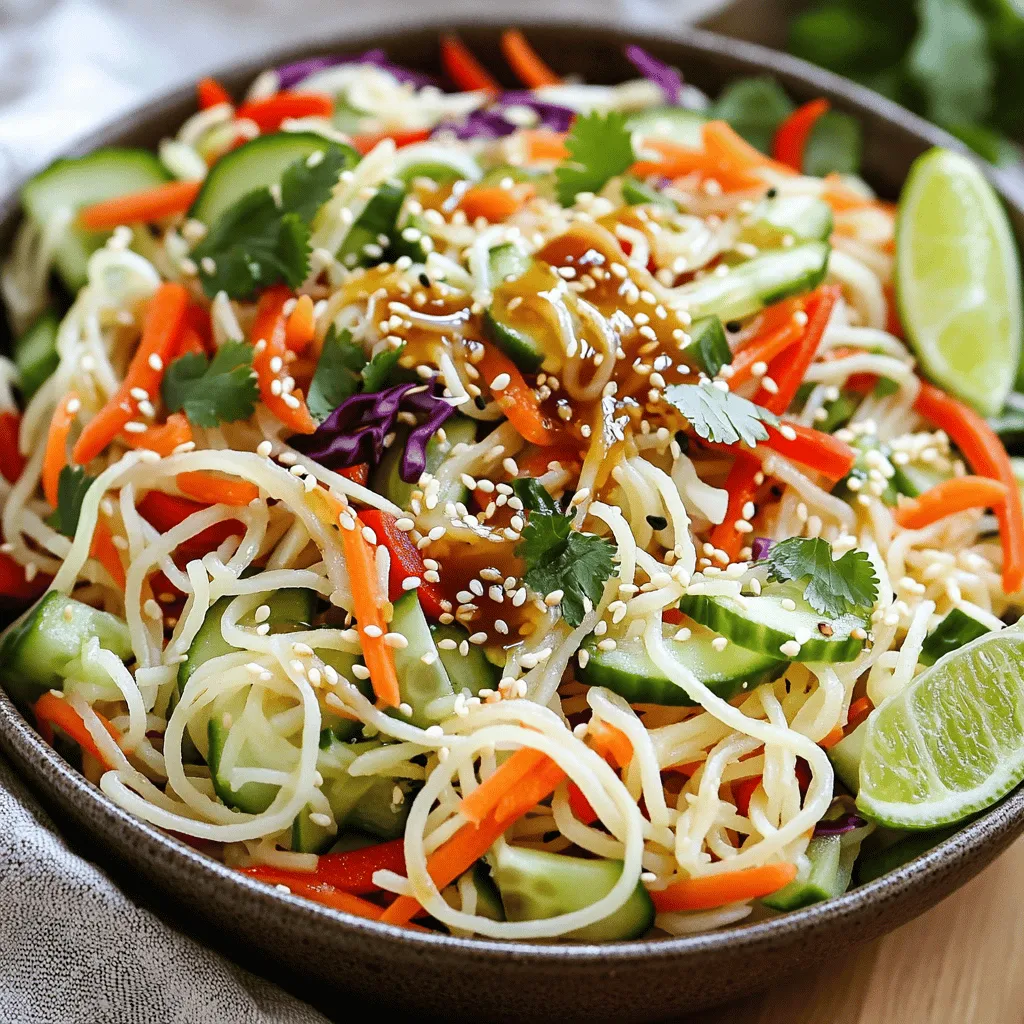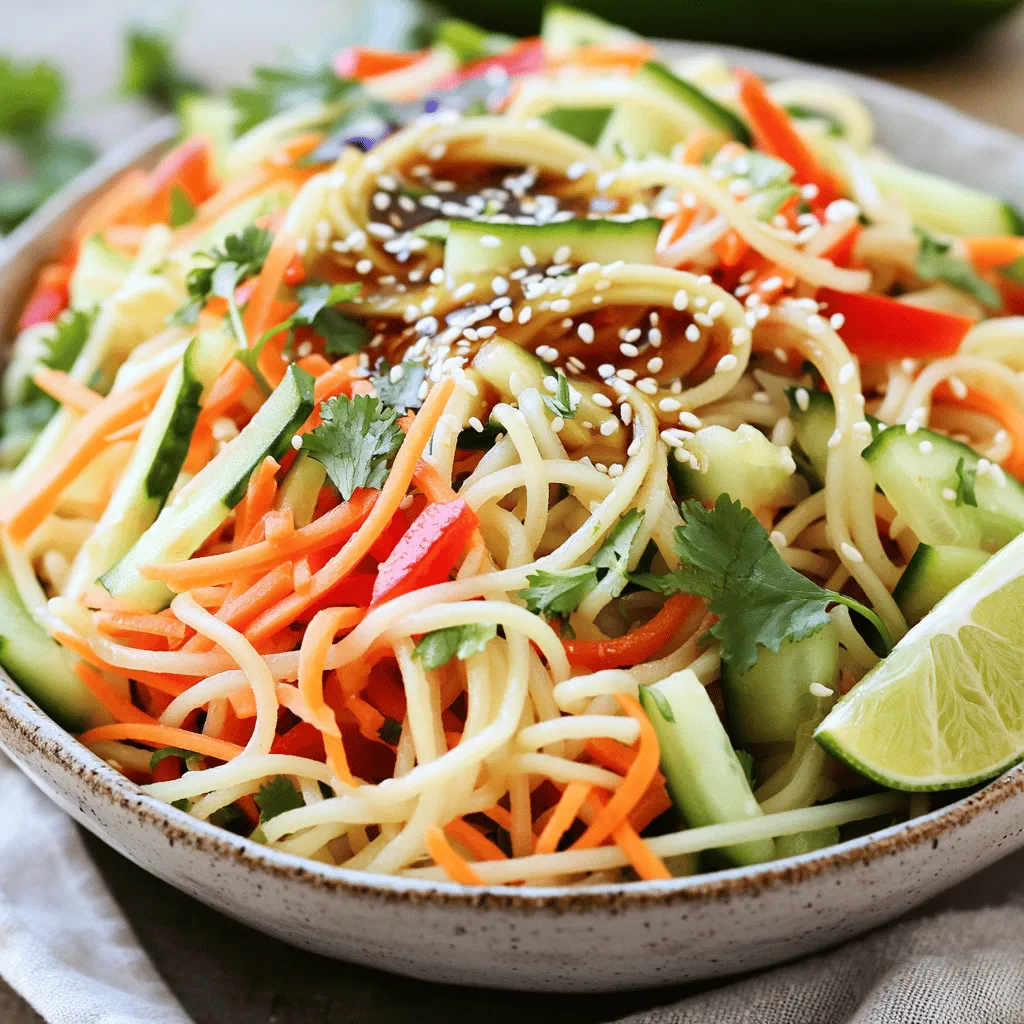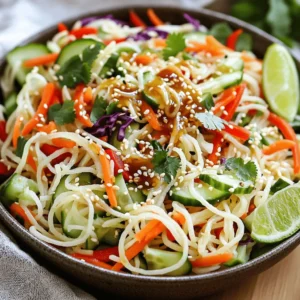Are you ready to excite your taste buds? This Flavorful Sesame Ginger Noodle Salad is fresh, vibrant, and easy to make. Packed with simple ingredients, this dish is perfect for lunch or dinner. In just a few steps, you’ll learn how to create a delicious noodle salad that’s bursting with flavor. Let’s dive into the ingredients and get cooking!

Ingredients
Main Salad Ingredients
For this vibrant salad, you will need:
– 8 oz rice noodles
– 1 cup shredded carrots
– 1 cup cucumber, julienned
– 1 bell pepper (red or yellow), thinly sliced
– 1 cup red cabbage, finely shredded
– 4 green onions, thinly sliced
– 1/4 cup sesame seeds, lightly toasted for flavor
– 1/4 cup fresh cilantro, chopped
These fresh veggies add color and crunch. Each bite bursts with flavor. The rice noodles provide a chewy base that holds everything together.
Dressing Ingredients
To make the dressing, gather these simple items:
– 1/4 cup low sodium soy sauce
– 2 tablespoons sesame oil
– 1 tablespoon fresh ginger, finely grated
– 2 tablespoons honey or maple syrup
– 1 tablespoon rice vinegar
– 1 teaspoon sriracha (optional for a spicy kick)
– Salt and pepper, to taste
This dressing adds depth to the salad. The ginger gives it a zesty kick. Adjust the sweetness with honey or maple syrup.
Optional Garnishes
For added flair, consider these garnishes:
– Extra sesame seeds
– More fresh cilantro
– Lime wedges
These toppings enhance the dish’s look and taste. Lime wedges add a bright, fresh note to your salad.
Step-by-Step Instructions
Cooking the Rice Noodles
First, grab 8 oz of rice noodles. Bring a pot of water to a boil. Once boiling, add the noodles. Cook them according to the package instructions until they are al dente. This usually takes about 4 to 6 minutes. After cooking, drain the noodles in a colander. Rinse them under cold running water. This stops the cooking process and cools them down. Set the noodles aside for later use.
Preparing the Vegetable Mix
Next, take a large mixing bowl. Add 1 cup of shredded carrots, 1 cup of julienned cucumber, and 1 thinly sliced bell pepper, either red or yellow. Then, add 1 cup of finely shredded red cabbage. Mix all the vegetables together well. This helps to spread out the colors and flavors evenly in the bowl. Finally, add the sliced green onions to the mix.
Whisking Together the Dressing
Now, it’s time to make the dressing. In a smaller bowl, combine 1/4 cup of low sodium soy sauce with 2 tablespoons of sesame oil. Add 1 tablespoon of finely grated fresh ginger. Then, mix in 2 tablespoons of honey or maple syrup, depending on your sweet preference. Pour in 1 tablespoon of rice vinegar and 1 teaspoon of sriracha if you want some heat. Whisk everything together until it’s well blended. Season with salt and pepper to taste. Remember, you can always add more seasoning if needed.
Tips & Tricks
Best Practices for Cooking Rice Noodles
To cook rice noodles well, follow these steps:
– Use a large pot of boiling water.
– Add noodles and stir gently to prevent sticking.
– Cook for just 4-6 minutes until they are al dente.
– Drain the noodles in a colander.
– Rinse them under cold water to stop cooking.
This method keeps the noodles firm and prevents them from getting mushy.
Flavor Enhancements and Adjustments
You can boost flavors in your sesame ginger noodle salad:
– Add more fresh ginger for a spicier kick.
– Mix in lime juice for a zesty twist.
– Use toasted sesame oil for a richer taste.
– Experiment with different sweeteners like agave syrup.
Adjust these ingredients to match your flavor preference!
Presentation Ideas for Serving
For a beautiful presentation, try these tips:
– Use a large bowl to show off the colorful ingredients.
– Add extra sesame seeds on top for crunch.
– Garnish with fresh cilantro for a green pop.
– Serve with lime wedges on the side for a fresh touch.
These ideas make your dish visually appealing and tasty!

Variations
Add Protein Options
Adding protein to your sesame ginger noodle salad makes it more filling. Try grilled chicken or shrimp for a tasty twist. You can also use tofu for a plant-based option. Just cube the tofu and sauté it until golden brown. This small change gives your salad more texture and flavor.
Vegetarian & Vegan Substitute Ideas
If you want to keep it vegetarian or vegan, replace honey with maple syrup. This small swap keeps the sweetness without using any animal products. You can also add chickpeas or edamame for protein. These options pack in flavor and nutrients while keeping the dish plant-based.
Different Vegetables to Include
Feel free to mix up the veggies! Broccoli florets or snap peas add a nice crunch. You can add radishes for a peppery taste or avocado for creaminess. Each vegetable brings unique flavors and colors to your salad. Explore and find your favorite combinations!
Storage Info
How to Store Leftovers
To store your leftover sesame ginger noodle salad, place it in a clean, airtight container. This keeps the flavors fresh and prevents any spills. Refrigerate the salad within two hours of making it. If you want to keep the dressing separate, store it in a small jar. This way, the noodles and veggies won’t get soggy.
Reheating Tips
You can enjoy this salad cold or at room temperature. If you prefer it warm, gently reheat it in a pan over low heat. Add a splash of water or more dressing to keep it moist. Avoid using a microwave, as it can make the noodles rubbery.
Duration of Freshness
Your sesame ginger noodle salad stays fresh for about three days in the fridge. After that, the veggies may lose their crunch. If you notice any odd smells or changes in color, it’s best to toss it. Enjoy the salad within this time for the best taste and texture.
FAQs
Can I make this salad ahead of time?
Yes, you can make this salad ahead of time. I often prepare it a few hours in advance. The flavors blend well when they sit. Just keep it in the fridge until you’re ready to serve. If you plan to store it overnight, hold off on adding the dressing until just before eating. This keeps the noodles and veggies crisp.
What can I substitute for rice noodles?
If you don’t have rice noodles, you can use other options. Some good substitutes are soba noodles or whole wheat spaghetti. You might even try zucchini noodles for a low-carb option. Just remember to adjust cooking times to get the right texture.
How spicy is the dressing with sriracha?
The dressing has a mild kick with sriracha. It adds flavor but is not too hot. If you like more spice, you can add more sriracha. Start with a little and taste as you go. This way, you can find the perfect heat level for your taste.
This salad combines fresh ingredients, tasty dressings, and fun garnishes. You learned how to cook rice noodles and prepare veggies. I shared tips for flavor and style, along with storage advice.
Try different proteins or veggies to change it up. Leftovers are easy to keep fresh. Use our FAQ section for quick answers. Enjoy making this salad! It’s fun and full of flavor.

